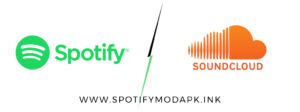Introduction – The Modern Hunt for Fresh Music
Once upon a time, discovering new music meant hanging out at record stores, swapping mixtapes with friends, or catching the latest indie bands at a local gig. Now? The hunt for fresh talent happens in your pocket, thanks to music streaming platforms. In 2025, the debate between Spotify and SoundCloud is one of the biggest for music lovers—both claiming to be the best place to discover emerging artists. But when it comes to discovering new artists, which one truly delivers? That’s exactly what we’re about to explore.
According to Rolling Stone, music discovery has shifted from radio stations to digital platforms, making services like Spotify and SoundCloud essential tools for both fans and creators.
Why Discovering New Artists Matters
Finding new music isn’t just about adding fresh tracks to your playlist—it’s about being part of a journey. When you discover an artist before they hit the mainstream, you’re not only experiencing their raw, authentic sound, but you’re also playing a role in their growth. Every stream, share, and recommendation helps amplify creative voices that might otherwise go unheard.
Supporting emerging talent is a way of nurturing diversity in the music industry. Instead of hearing the same repetitive tunes pushed by major labels, you open yourself up to unique genres, innovative sounds, and powerful stories from across the globe. It’s also a deeply personal experience—your music library becomes a reflection of your tastes, moods, and values.
For many listeners, there’s something magical about following an artist’s evolution—seeing them refine their craft, gain recognition, and release albums that resonate with larger audiences. In a world where algorithms often dictate what we hear, actively seeking out new artists is an act of curiosity, creativity, and cultural support.
Streaming Platforms as the New Talent Scouts
In the past, record labels held the keys to the kingdom. They decided which artists would get studio time, radio play, and a chance at stardom. Breaking into the music industry meant impressing a handful of executives who acted as gatekeepers.
Today, the landscape has completely changed. Streaming platforms like Spotify and SoundCloud have become the new A&R (Artists and Repertoire) departments of the digital age. Instead of relying on label scouts, artists can upload their music directly to the world, bypassing traditional industry barriers.
Algorithms now play a crucial role, recommending tracks to listeners based on their tastes, listening history, and even current trends. On Spotify, features like “Discover Weekly” or “Release Radar” can propel an unknown artist into the playlists of millions. SoundCloud, with its open-upload model and strong community of listeners and creators, often serves as the first stage where underground talent is noticed and celebrated.
User communities also act as grassroots promoters—sharing tracks, creating playlists, and spreading the word faster than any old-school marketing campaign. This democratization of music discovery means that talent can emerge from anywhere, whether it’s a bedroom studio in Berlin, a garage in Lagos, or a café in Buenos Aires.
Overview of Spotify
Brief History and Growth
Launched in Sweden in 2008, Spotify has grown into the largest streaming service in the world, with over 600 million monthly active users. It’s a polished, professional music ecosystem with licensing deals from nearly every major label.
Features That Support Artist Discovery
Spotify’s sleek interface and curated playlists make it easy for users to stumble upon fresh talent without trying too hard. From massive editorial playlists like New Music Friday to personalized ones like Discover Weekly, it’s a discovery engine disguised as a music player.
Algorithm-Driven Recommendations
Spotify’s biggest strength lies in its machine learning magic. It tracks what you play, skip, and replay, then serves you eerily accurate suggestions. It’s almost like it knows your taste before you do.
Overview of SoundCloud
Origins and Independent Artist Focus
SoundCloud started in 2007 in Berlin as a platform for creators to upload and share music without the traditional gatekeepers. It quickly became the go-to for underground hip-hop, EDM, and bedroom producers.
Community-Driven Uploads
Here, anyone can upload a track—no label, no distributor, no budget needed. This makes SoundCloud a breeding ground for experimental and niche sounds you won’t find anywhere else.
Free Access and Open Platform Model
Unlike Spotify’s tightly curated catalog, SoundCloud is an open canvas. You’ll find demos, remixes, podcasts, and even half-finished tracks—perfect for listeners who want to dig deep.
Music Discovery Tools Compared
Spotify’s Discover Weekly, Release Radar & AI Playlists
Spotify’s algorithms constantly refresh with music it predicts you’ll love. Playlists like Discover Weekly are tailored to your tastes, while Release Radar ensures you never miss new drops from artists you already follow.
SoundCloud’s Genre Tags, Reposts, and Trending Charts
SoundCloud’s discovery is more manual but more adventurous. Genre tags help you dive into specific scenes, while reposts act like a friend recommending a hidden gem.
Which Platform Surfaces New Talent Faster?
If you want polished, radio-ready tracks from rising stars—Spotify.
If you want to hear raw, unfiltered music from artists on day one—SoundCloud.
Artist Accessibility and Upload Process
- How Easy Is It for New Artists to Upload on Spotify?
Spotify requires distribution through services like DistroKid or TuneCore, which may involve fees. This extra step can be a barrier for broke but talented newcomers.
- SoundCloud’s Open-Door Policy for Creators
Anyone can upload directly to SoundCloud for free (with some limitations on hours). This makes it an instant launchpad for first-time artists.
Community and Social Engagement
- Spotify’s Social Sharing & Collaborative Playlists
Spotify lets you follow friends, share tracks to social media, and create collaborative playlists. It’s smooth, but interaction stays surface-level.
- SoundCloud’s Comment Sections and Real-Time Feedback
On SoundCloud, listeners can leave comments at specific timestamps in a track—turning songs into conversations. This direct engagement can be invaluable for artists refining their craft.
Audio Quality & Listening Experience
- Spotify’s Audio Formats & Streaming Quality
Spotify streams up to 320 kbps on Premium—crisp and reliable across devices.
- SoundCloud’s Varying Quality Levels
Because uploads come directly from creators, quality can range from professional studio to “recorded in a basement with a sock over the mic.”
Monetization for New Artists
- Spotify’s Royalty System
Spotify pays per stream, but rates are low for small artists—often requiring millions of plays to make a living.
- SoundCloud’s Fan-Powered Royalties
SoundCloud’s newer model pays based on your actual listening habits, which can give niche artists more earnings from dedicated fans.
Music Library Depth
When it comes to music library depth, Spotify is a powerhouse of polished, professionally produced tracks from globally recognized artists. Its catalog is packed with chart-toppers, popular albums, and timeless classics, making it a go-to choice for anyone who loves established hits and mainstream favorites.
SoundCloud, on the other hand, thrives in a completely different arena. It’s the hub for raw, experimental, and often self-produced music that pushes creative boundaries. Here, you’ll discover underground tracks, niche genres, and independent artists who are shaping the sound of tomorrow—often before they’re noticed by the mainstream.
This contrast makes the Spotify vs SoundCloud debate particularly interesting: it’s not just about quantity, but about the kind of music experience you’re after. If you prefer polished perfection, Spotify delivers. If you’re excited by the thrill of discovering fresh, undiscovered gems, SoundCloud is where you’ll want to dig deep.
Global Reach and Audience Size
In terms of global presence, Spotify takes the crown. With availability in over 180 countries and a massive user base exceeding 600 million active listeners, it’s one of the most far-reaching music streaming services in the world. This wide reach means that artists on Spotify have the potential to connect with listeners across continents almost instantly.
SoundCloud, while smaller in overall user numbers, holds a strong and loyal presence in indie and underground music circles. It’s especially popular in creative hubs, grassroots communities, and among artists who prioritize connection over commercial success. For independent musicians, SoundCloud offers a more approachable platform to grow an authentic fan base without the barriers of traditional distribution.
Cost for Listeners
Both Spotify and SoundCloud are designed to be accessible, offering free and premium subscription options to suit different budgets and listening preferences.
-
Free tiers:
Spotify’s free version comes with ads and limited skips, while SoundCloud’s free tier often allows more freedom in skipping tracks but may have fewer high-quality audio options. -
Premium tiers:
Spotify Premium unlocks ad-free listening, offline playback, and higher-quality streaming.
SoundCloud Go and Go+ remove ads, provide offline playback, and expand access to a broader range of licensed tracks.
In short, both platforms make it possible to enjoy music without paying a cent, but upgrading to premium enhances the experience for serious listeners.
Spotify vs SoundCloud – Comparison Table
Feature |
Spotify |
SoundCloud |
|---|---|---|
| Music Quality | ✅ High, consistent | ❌ Variable quality depending on upload |
| Catalog | ✅ Mainstream & rising stars | ✅ Underground & niche gems |
| Artist Uploads | ❌ Requires distributor | ✅ Direct upload, no middleman |
| Discovery Tools | ✅ Powerful algorithm-driven playlists | ✅ Community-driven tags & reposts |
| Monetization | ❌ Low per-stream rates for small artists | ✅ Fan-powered royalties for niche creators |
| Audience Reach | ✅ Massive global reach | ❌ Smaller but highly engaged audience |
| Interaction | ❌ Limited artist-fan engagement | ✅ Timestamped comments & direct feedback |
| Remix/DJ Set Friendly | ❌ Restricted due to licensing | ✅ Supports remixes & unofficial releases |
| Cost for Listeners | ✅ Free & premium tiers | ✅ Free & Go+ tiers |
| Best For | ✅ Polished, mainstream-ready discovery | ✅ Early-stage, underground artist discovery |
Which Platform Wins for Artist Discovery?
If you’re after algorithmic precision, Spotify is your best friend. If you want to discover artists before they hit the mainstream, SoundCloud is the place.
Conclusion – The Right Platform for You
When it comes to the Spotify vs SoundCloud debate, there’s no definitive “one-size-fits-all” answer. Each platform shines in its own way. Spotify offers a sleek, user-friendly experience with curated playlists, powerful discovery algorithms, and a massive catalog of both mainstream and emerging artists. It’s perfect for listeners who want high-quality audio, personalized recommendations, and seamless access to music from around the globe.
On the other hand, SoundCloud is a haven for independent creators, underground tracks, and experimental sounds you won’t hear anywhere else. It’s the go-to space for those who want to support grassroots talent, explore niche genres, and be the first to discover artists before they hit the mainstream.
The truth is, you don’t have to choose just one. By using both platforms, you can enjoy the polished discovery tools of Spotify while also diving deep into SoundCloud’s treasure trove of raw, unfiltered creativity. Whether you’re chasing chart-toppers or hunting for hidden gems, your perfect music discovery journey might just be a playlist that blends the strengths of both worlds.
FAQs
Q1: Can I upload music directly to Spotify?
No, you’ll need a distributor like DistroKid or TuneCore.
Q2: Which platform has more underground music?
SoundCloud.
Q3: Does SoundCloud pay better?
For niche artists with loyal fans—yes.
Q4: Which is better for DJs?
SoundCloud.
Q5: Can I use both platforms?
Absolutely.
Stay informed with real-time updates—keep in touch with Spotify Mod APK for the latest news.





